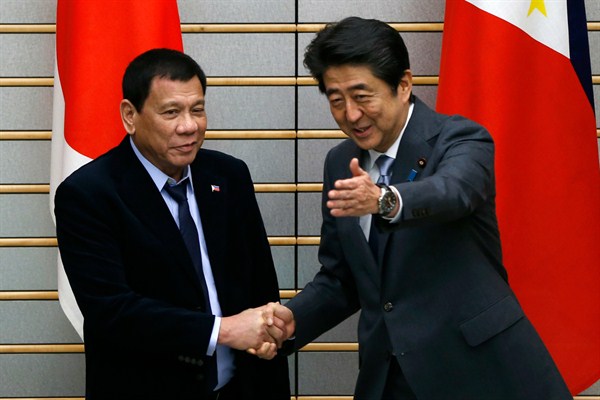Last week, Rodrigo Duterte, the combative and mercurial new president of the Philippines, made high-profile visits to China and Japan, which have the two largest economies in Asia. In Beijing, Duterte offered alarming comments about his desire to “separate” from the United States, the Philippines’ sole military ally and security guarantor. In his typical off-the-cuff manner, he publicly mused that it would be preferable to join in some trilateral relationship with China and Russia, rather than focus on Manila’s relationship with Washington.
China, looking to seize on Duterte’s vitriol against the U.S., offered him a massive suite of soft loans, investments and aid, totaling $24 billion. China then reportedly began restraining the actions of its coast guard against Philippine fishing vessels around the contentious Scarborough Shoal in the South China Sea. The move is largely seen as a soft concession to Duterte for his diplomatic U-turn with Washington. The move is significant for Manila, as it gives Filipino fishermen the right to fish again in an area closed off for years since the Chinese effectively blockaded the Philippines from the waters amid their escalating maritime dispute.
This geopolitical backdrop made for an extremely complex diplomatic environment when Japanese Prime Minister Shinzo Abe hosted Duterte after his China visit. Japan, more than any other country in the Asia-Pacific, has fully anchored itself to its longstanding ally, the U.S., in economic and security terms. The tense relationship between Beijing and Tokyo—fueled by a volatile dispute over the Senkaku Islands, which China claims as the Diaoyu, and natural resources in the East China Sea—has pushed Japan to further strengthen its security links with Washington over the past few years.

